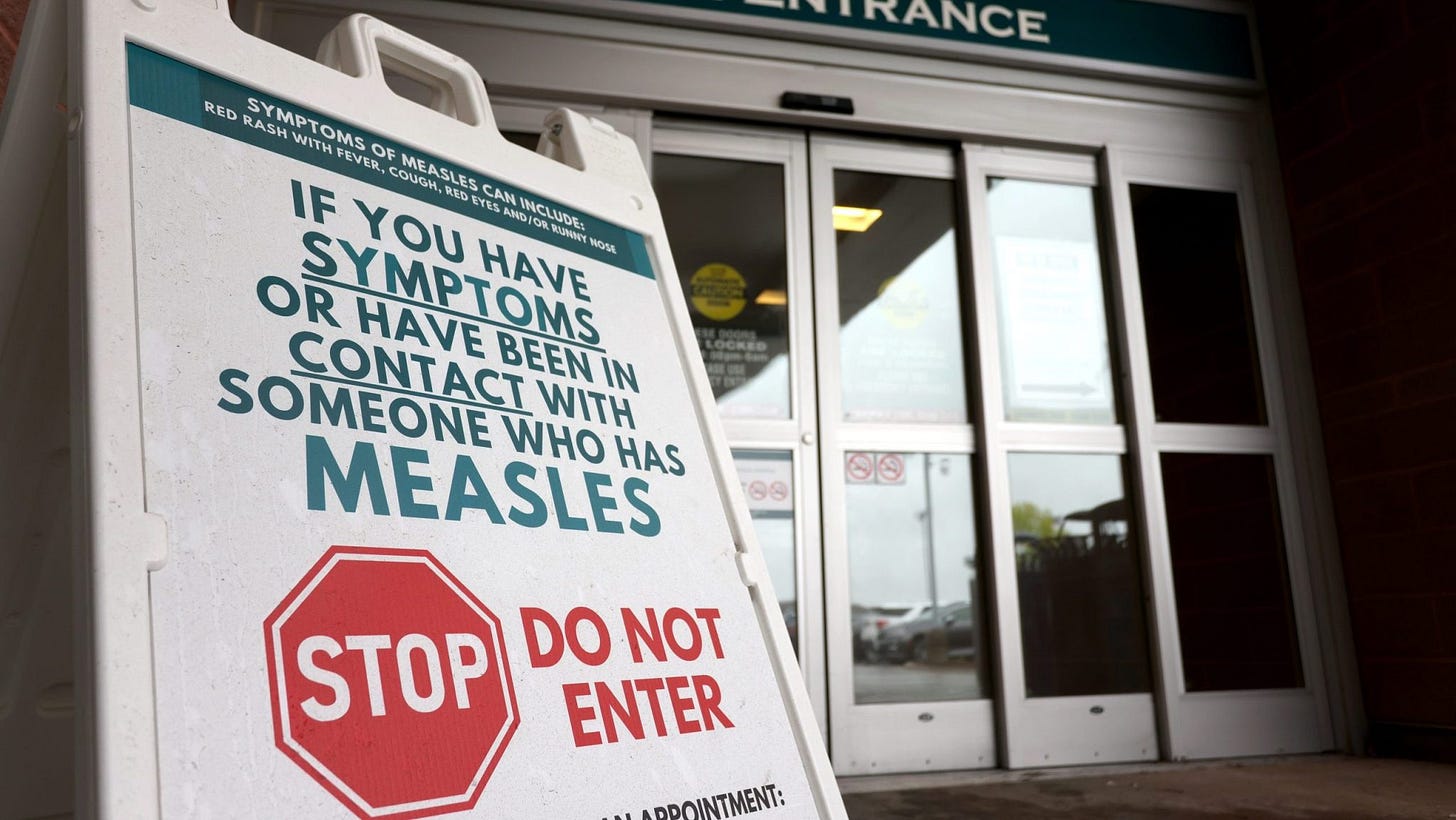Measles Makes a Global Comeback: From U.S. Surges to Canada’s Looming Setback
Once nearly eradicated, measles is spreading rapidly as vaccine skepticism grows, federal funding wanes, and health experts warn of ICU cases and deaths from this highly contagious virus.

Measles — once on the verge of being defeated globally — is surging again, thanks to vaccine skepticism. A high-profile outbreak in Texas has attracted the most attention, but the problem is worldwide. Canada has had more cases than the entire US this year, and could soon lose its status of having eliminated the virus, while the European Union saw an almost tenfold annual increase in reported cases to more than 35,000 in 2024. The change is driven by falling vaccination rates: Measles is highly contagious and 95% vaccine coverage is needed to break transmission, but many countries have uptake of 80% or less, with the lowest rates among ethnic minorities. In London, just 73% of five-year-olds are vaccinated - Semafor
Measles has been officially “eliminated” from the U.S. since 2000, which means the country had not seen very large outbreaks and had not had 12 months or more of uncontrolled domestic transmission of the virus since before that time. However, in just the first half of 2025 the U.S. has reported more cases of measles – 1,309 confirmed cases as of July 15 – than in any year since 1992. In addition, state and local health departments, which have key responsibilities for measles prevention and response efforts across the country, are contending with reduced support from the federal government under the current administration and staffing and budget cuts in many jurisdictions. Further, the past few years have seen more skepticism among the public about the safety and effectiveness of measles vaccines and a decline in trust of health authorities in general, contributing to lower vaccination rates and complicating outreach and communication efforts to combat measles - KFF
Health experts are keeping a close eye on the measles situation in the western Canadian city of Calgary (the transit point for world leaders attending the G7 Summit in June) as case counts tick up and they're warning that vigilance is key. The number of confirmed cases has nearly doubled in about a month after remaining relatively low and stable for several months. As of midday Friday, the Calgary health zone accounted for 44 of the province's 1,538 confirmed cases this year. "We have more to come and I think that this is the tip of the iceberg," said Dr. Tania Principi, a pediatric emergency physician and associate clinical professor at the University of Calgary's Cumming School of Medicine. She's seeing an increase in Calgary children with measles. And they can be very sick, she warned. "A lot of these kids get quite significant pneumonias, trouble breathing. They've needed to go to the ICU," she said. "Measles is dangerous. People can die from it.... You can have brain damage from it. So it's not just like a cold." Measles is highly contagious and can hang in the air for several hours after a person leaves a location. The virus can lead to serious complications including pneumonia, brain inflammation, premature delivery and even death. And there is no treatment for measles, according to Principi. "I'm worried, to be honest.... People start spreading measles even before they know they have it," she said - CBC
My hot take analysis:
🌍 World Briefing | Hot Take
Measles Was Nearly Eradicated. Now It’s a Global Emergency — Again
I never thought I’d be writing this.
Years ago, I worked closely with the World Health Organization on a book chronicling one of global health’s greatest achievements: the elimination of measles and rubella in the Americas. It was a triumph of science, political will, and cross-border cooperation — with First Ladies across the hemisphere championing the cause. The Americas became the first WHO region to wipe out measles.
But the book was never published. And now, tragically, the virus is back — with a vengeance.
Measles, one of the most contagious diseases known to humankind, is spreading fast again. Countries that once eliminated it — including in North and South America — are seeing new outbreaks. Global health officials now warn that the Americas could lose their measles-free status.
The cause? A perfect storm of vaccine skepticism, post-COVID mistrust, conflict, and disinformation. I warned in my book Digital Pandemic that the backlash to lockdowns and mandates would erode trust in public health. We’re now witnessing the fallout — not just with measles, but with other preventable diseases as well. In Gaza and many regions of Ukraine, for instance, vaccination campaigns are impossible due to their respective wars. Then there are also geographical factors - take Brazil, which has 10 neighbours. Many countries in the Americas have long borders, many of them porous.
We are dangerously close to squandering decades of public health progress. Herd immunity is breaking down. Routine immunization is slipping. And vulnerable children — especially in conflict zones — are being left unprotected. Over the last five years, measles outbreaks have hit over 100 countries, home to roughly three-quarters of the world’s children, according to UNICEF.
Vaccines work. From 1996 to 2010, the rubella vaccine brought the number of rubella (congenital rubella syndrome is a tragic condition that often leaves children both blind and deaf) cases in the Americas to just three, from a high of 10,066, according to the Measles and Rubella Initiative.
This is not the time to forget that.
“Measles is dangerous. People can die from it.... You can have brain damage from it. So it's not just like a cold” - Dr. Tania Principi, a pediatric emergency physician and associate clinical professor at the University of Calgary's Cumming School of Medicine
“We have to continue to remind, as governments change….that vaccination is one of the best buys in global health. And in many instances it is not only cost-effective but cost-saving. And also reminding political leaders that it’s good politics. If you are free of measles and rubella and polio – it’s good politics. You want to have that as a political leader and you don’t want to have an outbreak that could draw unwanted attention to your limitations as a government” - Stephen L. Cochi, former senior advisor to the CDC Center for Global Health
U.S. President Donald Trump plans to "take over" the Gaza aid effort, U.S. officials say. According to Axios, special envoy Steve Witkoff and Trump discussed plans for the U.S. to significantly increase its role in providing humanitarian aid to Gaza in a meeting Monday evening at the White House, according to two U.S. officials and an Israeli official with knowledge of the issue. Negotiations for a ceasefire are stuck, and Israeli Prime Minister Benjamin Netanyahu is moving towards significantly expanding the war. U.S. officials are concerned about more bloodshed but have yet to firmly object. A U.S. official said it was decided that the Trump administration will "take over" management of the humanitarian effort in Gaza because Israel isn't handling it adequately. The official didn't say what the U.S. role would actually entail, but said Gulf countries like Qatar will contribute funds, while Jordan and Egypt will also likely be involved. The White House didn't respond to requests for comment. Trump is "not thrilled" about the idea of the U.S. taking charge, "but it kind of has to happen," the official said. "There doesn't seem to be another way….The starvation problem in Gaza is getting worse. Donald Trump does not like that. He does not want babies to starve. He wants mothers to be able to nurse their children. He's becoming fixated on that," the official continued. A second U.S. official said the administration will be careful not to get dragged too deep into the Gaza crisis. "The president doesn't want to see the U.S. being the only country throwing money at this problem. It's a global problem. And he's been tasking Witkoff and others to make sure everyone is stepping up, our European friends and our Arab friends," the official said.
Meanwhile, Israeli Prime Minister Benjamin Netanyahu hinted at wider military action in devastated Gaza on Tuesday - including total reoccupation of the seaside strip. But former Israeli army and intelligence chiefs called for an end to the nearly 22-month war. Among those speaking out were former leaders of Israel’s Shin Bet internal security service, Mossad spy agency and the military — and also ex-Prime Minister Ehud Barak. In a video posted to social media this week, they said far-right members of the government are holding Israel “hostage” in prolonging the conflict, the AP reported. Netanyahu’s objectives in Gaza are “a fantasy,” Yoram Cohen, former head of Shin Bet, said in the video. “If anyone imagines that we can reach every terrorist and every pit and every weapon, and in parallel bring our hostages home — I think it is impossible,” he said. Israeli media reported disagreements between Netanyahu and the army chief, Lt. Gen. Eyal Zamir, on how to proceed. The reports, citing anonymous officials in Netanyahu’s office, said the prime minister was pushing the army, which controls about three quarters of Gaza, to conquer the entire territory — a step that could endanger hostages, deepen the humanitarian crisis and further isolate Israel internationally.
Intensifying Israeli attacks across the Gaza Strip have killed at least 74 Palestinians, including 51 aid seekers, so far today. Eight more Palestinians, including a child, have died due to Israeli-induced starvation over the past 24-hour reporting period, health officials in the besieged territory say. Israel allowed just 95 trucks of aid into Gaza on Monday, a figure equal to just 15 percent of the minimum 600 trucks needed each day to meet the basic needs of the population, according to data from Gaza’s Government Media Office - Al Jazeera
Norway’s government has ordered the central bank to review its sovereign wealth fund’s investments in Israel to ensure they do not include any companies that contribute to Israel’s occupation of the West Bank or war on Gaza.
The review comes after a report by Norway’s Aftenposten newspaper revealed that the sovereign wealth fund has a stake in an Israeli jet engine group, Bet Shemesh Engines Ltd (BSEL), which provides services to Israel’s armed forces.
Prime Minister Jonas Gahr Store reacted by saying, “We must get clarification on this because reading about it makes me uneasy.” - Al Jazeera
My hot take analysis: Trump’s plan to “take over” Gaza’s humanitarian aid effort is misguided and politically tone-deaf. It comes as the U.S. federal disaster response has been crippled by funding cuts, leaving communities devastated by Texas floods and West Coast wildfires to mostly fend for themselves. Now, with domestic infrastructure and emergency services in disarray, Trump wants to rebrand as Gaza’s savior — a move that risks alienating his already anxious MAGA base, which is increasingly wary of U.S. involvement in distant conflicts. Even if well-intentioned, this plan lacks credibility and capacity. After his own arson attack on USAID and the State Department — hollowing out expertise, slashing budgets, and driving away seasoned professionals — responding to overseas emergencies like Gaza’s man-made famine becomes exponentially harder. How can Washington manage aid halfway across the world when it can’t handle disasters at home? Rather than a strategic pivot, this feels like a rushed political stunt that could drag the U.S. deeper into Middle East turmoil without solving the humanitarian crisis.
Trump on Tuesday said he would hit India with higher duties within 24 hours, after New Delhi slammed Washington’s tariff threats over its purchase of Russian oil as “unjustified and unreasonable,” jeopardizing their emerging partnership. Though Indian elites long viewed the US with suspicion, relations between the two countries have improved in recent decades — particularly after Prime Minister Narendra Modi came to power, with Washington viewing the Asian nation as a potential bulwark against a rising China. But Indian scholars and officials are increasingly angry with the US: One leading expert warned that capitulating to Washington would be “an affront to India’s dignity,” others lauded the country’s warming relations with Beijing, and a former top Indian diplomat argued that “there is very little possibility of a reconciliation.” - Semafor
Other than China, no country is buying more Russian oil these days than India. It shows no sign of stopping, either. On Tuesday, Lloyd’s List, the shipping industry’s main trade journal, reported that three oil tankers made delivery at Indian ports over the weekend — after Mr. Trump had threatened to impose a penalty. According to The New York Times, Delhi is buying much more than it did before the Russian president, Vladimir V. Putin, launched a full-scale invasion of Ukraine in February 2022. Shortly before the start of the war, crude oil from Russia accounted for 0.2 percent of how much India imports. By May 2023, Russia was selling India more than two million barrels of crude a day, or roughly 45 percent of its imports. India has bought a nearly constant flow of Russian oil for the past two years. Prices fluctuated, with total sales worth more than $130 billion per year. Iraq and Saudi Arabia, traditionally India’s biggest suppliers, have been pushed to the side. In June 2023, an analysis of shipping data by The New York Times found that dozens of Russian tankers were arriving every month to Indian oil refineries. India is buying so much Russian oil because it’s cheaper since sanctions have narrowed potential demand and held down the price. Another reason is that India is not a major producer of oil, and it is the world’s most populous nation and fastest-growing big economy. It needs a lot of oil. India’s purchases of Russian oil have suited both sides. Russia is able to sell its crude oil, theoretically under a price cap the European Union had set at $60 a barrel, and India buys it at a discount. India’s oil companies have refined some for domestic consumption and exported the rest to Europe and elsewhere as diesel and other products. In addition to helping power India’s economy, cheap Russian oil has helped India establish a lucrative business exporting refined products to regions that need fresh energy supplies. One of India’s refineries, the Jamnagar site on the country’s west coast, is the largest in the world - NYT
Afghanistan is seeing its sharpest-ever surge of child malnutrition, the World Food Programme says, adding it needed $539 million to help the country’s most vulnerable families. Almost 10 million people, a quarter of Afghanistan’s population, face acute food insecurity. One in three children is stunted. The WFP said the rise in child malnutrition was linked to a drop in emergency food assistance over the past two years because of dwindling donor support. In April, the administration of US President Donald Trump cut off food aid to Afghanistan, one of the world’s poorest countries. The US had been the largest funder of the WFP, providing $4.5 billion of the $9.8 billion in donations last year. Previous US administrations viewed such aid as serving national security by alleviating conflict, poverty, extremism and curbing migration. Food insecurity in Afghanistan is being worsened by mass returns from neighboring countries, which are deporting foreigners they say are living there illegally - CNN
Portugal is experiencing a new heatwave, with temperatures likely to reach 41ºC. The month of August could even be the hottest in the last 15-20 years. Maximum temperatures range from 28ºC (Aveiro) to 41ºC (Braga and Évora). The northern regions of mainland Portugal, Viana do Castelo, Braga, Porto, Vila Real and Bragança, are once again subject to a red heat alert. The red alert, the highest on a scale of three, is due to the persistence of extremely high maximum temperatures, except on the coast, according to the Portuguese Meteorological Institute (IPMA). According to climatologist Mário Marques, quoted by CNN Portugal, this August could be the hottest in recent years. "It could be the hottest August in the last 15 to 20 years, in general terms, especially in terms of minimum temperatures, but also in terms of maximum temperatures," Marques told the broadcaster. The climatologist also pointed out that, from 10 August, Portugal could see a further rise in temperatures, due to a "very intense anticyclone that may recede, oscillate in position, but will be measured at present". Mainland Portugal has entered a state of alert due to the high risk of fires in the coming days - Euronews




